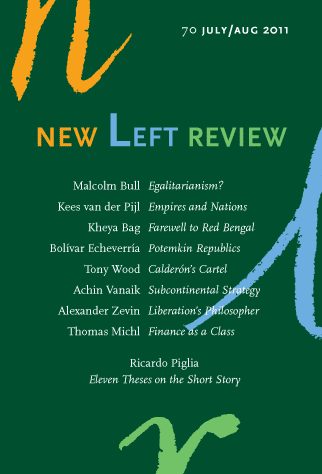Beyond existing arguments about equality, might the praxes of permanent and passive revolution offer a way to conceptualize a more expansionary levelling? Drawing on motifs from Nietzsche, Babeuf, Marx and Gramsci, Malcolm Bull traces the contours and consequences of extra-egalitarianism.
The triple crisis—of Western hegemony, of capital and of the nationstate form—within which the Arab uprisings of 2011 have unfolded, and longer-run history of Anglo-American strategies for containing popular aspirations to sovereignty.
In his final essay, the late Bolívar Echeverría considers the bicentennial history of Latin America’s oligarchic states. While elites stage empty rituals of affirmation, might the continent’s marginalized majorities be reimagining national identity?
Argentina’s leading novelist reflects on the hidden architecture of the form, and the unfolding of its iterations from Chekhov to Hemingway, Kafka to Borges.
After the CPM’s ejection from office in Calcutta, how to explain the remarkable longevity of its rule and causes of its eventual downfall? Kheya Bag surveys the record of its three decades in power, and the mechanisms that sustained—and subverted—the party’s hold on the state.
Achin Vanaik explores the specificities of India’s social formation and its lefts, in the only country where both Stalinism and Maoism remain significant political actors. In the wake of recent electoral reverses, what are the prospects for radical renewal?
Thomas Michl on Gérard Duménil and Dominique Lévy, The Crisis of Neoliberalism. Analytical long view of the Great Recession, seeing its origins in the stranglehold of finance and elite self-enrichment.
Tony Wood on Anabel Hernández, Los señores del narco. The structures of political complicity and corruption that have fuelled Mexico’s drug wars.
Alexander Zevin on Paige Arthur, Unfinished Projects. Restoring Sartre’s engagements with decolonization and anti-imperialism to their rightful place within his oeuvre.
